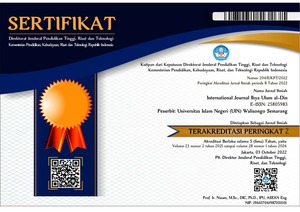Epistemology of Islamic Education Al-Jabiri Perspective of the Conservative-Modernist-Neo Modernist Flow and Burhani-Bayani-Irfani
DOI:
https://doi.org/10.21580/ihya.22.2.5673Keywords:
Epistemology of Islamic Education, Conservative-Modernist-Neo Modernist, Burhani-Bayani-IrfaniAbstract
This research is a qualitative study using a library approach, the object is the epistemology of Islamic education, conservative-modernist-neo-modernist and burhani-bayani-irfani. The data collection method in this research uses literature study. In this stage, the researcher tries to select data (books) in the epistemology of Islamic education, conservative-modernist-neo-modernist and burhani-bayani-irfani. In this writing, the analysis used with hermeneutics, namely the author explains that behind the text there is context meaning or behind the explicit meaning there is an explicit meaning if interpreted literally can be interpreted as an interpretation or interpretation of the epistemology of Islamic education, conservative-modernist-neo-modernist and burhani-bayani- irfani. The author also uses content analysis, namely research conducted on information documented in recordings, both images, sounds, writing and others. With this method, data analysis and scientific processing will be carried out on the epistemological content of Islamic education, the conservative-modernist-neo-modernist and burhani-bayani-irfani schools. The results showed that science continues to develop throughout the history of thought such as rational flow of viewing educational activities as actualizing the potentials of individuals so that according to this flow the essence of education is the transformation of various potential potentials into actual abilities. The success of the transformation of the various potentials that exist in this rational flow, is largely determined by how much the optimization of the functions of sense powers and ratios. Baby epistemology is an epistemology that emphasizes the authority of the text as an indicator of truth. Reason in this epistemology is only as a support text and does not have a good space or in other words lower when compared to the text. In object Bayani tradition can be seen in fiqh. Second, Burhani epistemology is knowledge gained from demonstrative analogies which in this case gives the role of reason and senses in human beings. Third, the epistemologist irfani is knowledge gathered from the human heart.Downloads
References
Achmad Mulyadi. 2018. Pemikiran Al-Khawarizmi dalam Meletakkan Dasar Pengembangan Ilmu Astronomi Islam. International Journal Ihya "Ulum aldin, 20.
Al-Jabiri Muhammad ’Abid, Bunyah al-’Aql al-’Arabi. 1991. Takwin al-’Aql al-’Arabi. al-Markaz al-Tsaqafi al-Arabi.
Amin Abdullah. 2003. Reuniting Religious and General Sciences: Efforts to Unite Islamic and General Epistemology,. Sunan Kalijaga Press.
Hamalik, Oemar. 2003. New Approach of Teaching and Learning Strategies Based on CBSA. Sinar Baru Algensindo.
HS, Muhammad Alwi, and Nur Hamid. 2019a. “Diskursus Kelisanan Al-Qur’an: Membuka Ruang Baru.” Journal of Islamic Studies and Humanities 4(2): 262–82. http://journal.walisongo.ac.id/index.php/JISH/article/view/5232.
———. 2019b. “Relasi Kelisanan Al-Qur’an Dan Pancasila Dalam Upaya Menjaga Dan Mengembangkan Identitas Islam Indonesia.” International Journal Ihya’ ’Ulum Al-Din 21(1): 17–38. http://journal.walisongo.ac.id/index.php/ihya/article/view/4833.
Kartanegara, Mulyadi. 2007. Religious Reason: Understanding The Essence of God, Nature, and Humans. Erlangga.
Nikmah Rochmawati. 2018. Redeveloping Peace in Contemporary Islam. International Journal Ihya ’Ulum Aldin, 20.
Qomar, Mujamil. 2005. Epistemology of Islamic Education; from the Rational Method to the Critical Method. Erlangga.
Soleh, A. Khudori. 2004. New Discourse of Islamic Philosophy. Student Library.
Sudjana, Nana. 2002. Basics of Teaching and Learning Process. Sinar Baru Algensindo.
Supena, Ilyas. 2008. Design of Islamic Sciences in Hermeneutic Thought Fazlur Rahman,. Walisongo Press.
Downloads
Published
How to Cite
Issue
Section
License
By submitting an article to the journal, the author(s) agree to transfer the published article's copyright to the journal, which will act as the publisher. This means the journal will have the right to publish the article in various forms, including reprints. The journal will maintain the publishing rights to the published articles.
This work is licensed under Creative Commons Attribution-ShareAlike 4.0 International License.
In line with the license, authors and third parties (readers, researchers, and others) are allowed to share and adapt the material. In addition, the material must be given appropriate credit, provided with a link to the license, and indicated if changes were made. If authors remix, transform or build upon the material, authors must distribute their contributions under the same license as the original.



